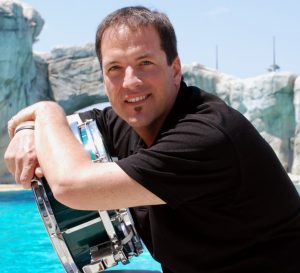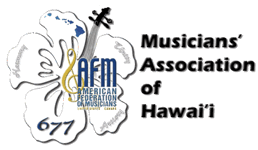 Aloha my fellow musicians and happy holidays!
Aloha my fellow musicians and happy holidays!
We’ve had quite an eventful 2016 so far.
After taking over as President in June of 2015, there were quite a few issues that needed addressing. Many members contributed to handling some of our most pressing concerns and for that, I am thankful.
We successfully negotiated new collective bargaining agreements with the Hawai‘i Symphony Orchestra, Hawai‘i Opera Theatre, and are currently in negotiations with Diamond Head Theatre. As these agreements are essential to providing guaranteed employment for our local musicians, I personally viewed these as top priorities for our union to stabilize and nurture these agreements. The Orchestra Committee, chaired by Jordan Schifino, along with former committee chair Jason Byerlotzer, helped bring both the orchestra and opera agreements over the line. Both agreements were ratified by the HSO musicians. I wish to thank them all for their hard work and dedication to the process.
Looking forward, we still are working to have an updated agreement in place for the musicians at Diamond Head Theatre. The rates and conditions have not been revisited since the 1990s. Although DHT has always hired union musicians, paid pension, and paid the musicians as employees, we felt that it was time to revisit the relationship and adjust the rates to a more modern rate.
Our negotiations so far with DHT have been productive, although financially, we still have work to do. The musicians have recognized that bringing the rates from 1991 to 2016 might be too much of a shock for the organization, so we are attempting to broker a multi-year deal that would ease the rates closer to the current standards over the span of three years, while offering some relief to the employer in other areas.
“Collective bargaining is the lifeblood of our organization. It works when musicians stand together to make their voices heard.”
After that, we are looking to approach the musicians who perform at other theaters and other orchestras around the state, as several theaters tend to grossly underpay or in some cases, not pay their musicians at all.
One comment that came up during our DHT negotiations that stuck with me is very important. Management was disheartened by seeing some of the musicians that play at DHT productions going into other theaters and performing for less money. I cannot agree more. I can understand the desire to play can sometimes override our business sense; however, in so doing, we are only hurting ourselves and our ability to earn a sustainable living from our craft. This is true in not only theaters, but in symphonic, freelance, convention, and recording venues.
In the past year, we have had several members insist on union contracts for recording sessions, television dates, and live performances. In most every instance, an AFM agreement was put in place that paid at least scale wages, pension, and an H&W contribution. Those dates could’ve easily gone unreported, but because the musicians themselves insisted on having those agreements in place, it happened. Most people that we deal with are used to working with contracts: Why shouldn’t we as musicians have the same protections? Without a contract, there is little recourse against a party who defaults. If someone is hesitant to put in writing what they have said in words, be wary, as there is a likelihood they have no intention of living up to their end of the deal.
A common rationalization I’ve heard is, “If I insist on too much, I may lose the gig to another musician who will take less or work without a contract.” That may be true, but if that musician takes that decision to work for less or not use a contract, they themselves have become what they feared and they have become the musician who will undercut the professional market.
The best way to preserve the status of professional musicians is to keep and enforce area standards. By uniting as one voice, we can send a clear message that while we love our roles as musicians, we expect fair treatment and compensation for our talents.
In your service,
Steve
From the Winter 2016 issue, Ke Ola O Na Mele
In this issue:
President’s Message: “Collective bargaining is the lifeblood of our organization. It works when musicians stand together to make their voices heard.” —Steve Pearson
Member Spotlight: George Kuo, Hawaiian slack key guitar master: “The sounds of the traditional Hawaiian slack key guitar touch my senses and invigorate me like no other music or activity — it’s such an overwhelming, good feeling.”
2016 Election Results: The results of the Aug. 22, 2016 Local 677 elections are here!
Building Update: 949 Restrooms & Building Cleanup — Renovations are a dirty business, but union musicians are up to the challenge. A select few gave parts of the union headquarters some much-needed love.
Of Note:
-
Youth Symphony 1 on NPR — If you think the union members are uber-talented, just look what some of their kids are doing.
-
Mike Lewis Big Band featured at the Blue Note — This budding jazz big band made history at the Blue Note Hawaii in Waikiki recently, in more ways than musical.
